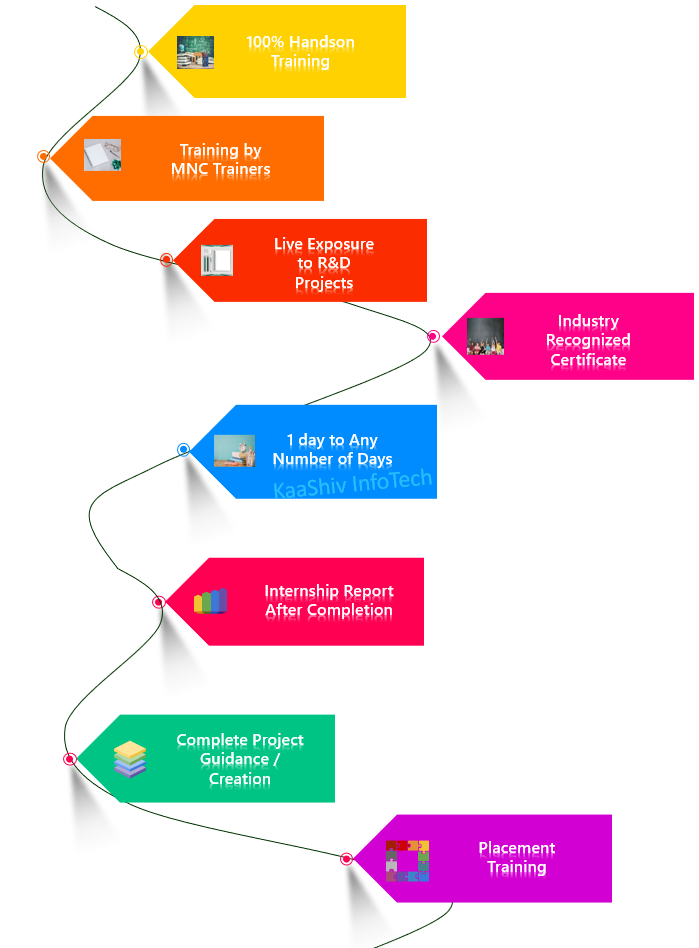India’s No:1
Blockchain Internship In Chennai
KaaShiv Infotech offers a comprehensive Blockchain Internship program, providing in-depth knowledge of blockchain technology. Whether you choose an online internship or an offline internship in India, our program allows students to learn the latest trends and technical skills in blockchain. This blockchain internship in chennai will help you build a strong foundation for your career in the growing blockchain industry.
- Network Hacking
- Command Shell Hacking
- System Hacking
- File Server Hacking
- Web Server Hacking
- Website Hacking
- Mobile Hacking
- Penetration Testing
- Social Network Hacking
- Email Hacking
- Wifi Hacking
WHAT WE GIVE?
Certificates and Documents we offer for this Training
- Internship Certificate.
- Project Completion Certificate.
- Inplant Training(IPT) Certificate.
- Free Workshop Certificate.
- Free Corporate Training Test certificate.
- Training Documents.
- Sample Resume for Placement.
- Useful Softwares.
- Internship Report.
- Our AI Training Portal Access.
Why Internship is Important?
BLOCKCHAIN INTERNSHIP IN CHENNAI

Learn by Doing
Put your skills to work on real projects, not just practice problems.

Find Your Passion
Try different areas of blockchain internship in chennai to see what clicks

Level Up Your Skills
Gain practical experience that will impress future employers

Boost Your Resume
Show employers you're serious and have what it takes
BEST COMPANY OFFERING BLOCKCHAIN INTERNSHIP
Why to choose KaaShiv Infotech for
blockchain internship
The course curriculum for Blockchain Internships in Chennai is meticulously designed and curated by industry professionals from leading MNCs to meet the latest trends and demands in the blockchain technology landscape. After completing a Blockchain Internship at KaaShiv Infotech, students will gain hands-on experience in blockchain development, smart contract creation, and decentralized applications (DApps). Below are some key highlights of our blockchain internship in chennai:


blockchain internship in chennai
Short Term Internship ( blockchain internship in chennai )
Learn and Implement
45 Concepts Covering 7 Technologies
+ 2 Projects
Short Term - blockchain internship in chennai
- Blockchain Internships – Duration: 1 day, 2 days, 3 days, 5 days / 10 days or Based on Student Preference
- Training hours: 3 hrs per day
- Software & other tools installation Guidance
- Hardware support
- Blockchain Internship Report Creation / Blockchain Internship Projects
- KaaShiv Infotech is a leading provider of Blockchain internships, offering hands-on experience in real-time blockchain projects – After 6 months of regular Paid Internship, Internship becomes free + For best interns, a stipend will be provided + Best Interns will be offered Job too.
- Internship Certificate & Inplant Training Certificate & Industrial Exposure Certificate + (Achievement Certificate for best performers)


S.No |
blockchain internship in chennai – Syllabus100% Practical – Live HandsOn – blockchain internship syllabus |
|---|---|
| Topic 1 : | Ethical Hacking Basics
( Introduction Hacking , Job Openings, Mega Breach History , Hacking Terminologies , Elements of Information Security, Motives of Information Security, Information Security Threats Categories , Hacker Classes , Website Info Extraction , Penetration Testing , Bot Website , Website Directory Extraction , SQL injection , Hacking Social Data )
|
| Topic 2 : | Network Hacking
( What is Networking? , Network Scanning Basics , How Network Scanning Works ? , Types of SCANNING , THREE WAY HANDSHAKE , ICMP SCANNING , PING SWEEP SCANNING , TCP Communication FLAGS , Full Open Scan , Stealth Scan – Half-Open Scan , UDP Scan , Check Live System , What is Port Scanning , Lists of Ports , Check Open Ports , Network Mapping , Proxy Servers , Counter Measures )
|
| Topic 3 : | Command Shell Hacking
( What is Operating System , Famous Operating System , Shell Programming, Basic Requirements for Shell , Fetch Computer Hardware, Fetch Computer Total Memory , Fetch Computer RAM Memory, Fetch Hard Disk Details , Command to get system information , Utility to get System Information , Bypass Windows Default execution & increase , Process priority , Installing Packages Using PowerShell , Powerful Copy Command , Fetch RAM Memory Details , Fetch RAM Memory HW Details , Fetch Driver Details , Free Format of Folder Listing , Get list of Tasks Running in Computer , Get list of Services Running in Computer , Delete Files using PowerShell , Delete Folders using PowerShell , Find User Last Login Details , Restart Computer using PowerShell )
|
| Topic 4 : | System Hacking
( How to find IP Address of a Computer , How to find IP Address of a Website Calculate How much data transferred in a network , How to find the path of accessing the website , Find IPV4 and IPV6 details of the Website Server ? , Find Wifi Status , Find Wifi Security Info Find Wifi Password , Get the MAC Address from IP Address , Flush the Network Connection ,Tool to find the Website Owner Details , Tool to Check Website is Alive or not , Tool to Check Computer Information’s heart beat , Tool to Check Processes individually , Check for Windows For errors ,Making Password Never Expires , Find the Security ID of the User , Access Control Panel as a Specific User , Tool to Fetch Complete PC Information , Find the Security ID of the User , Access task Manager information from Tools , Tool to find Users Logged in to the System , Hack Administrator Account , Hack Windows Bypassing using USB , Hack Windows By confusing , Virus Check Software , Memory Hijack Software , USB injection Software Driver Check Software , Browser Clean Software , What is Volume Licensed MS products , Ccleaner – memory cleanup , Malware Threats , Viruses Hacking , Resident Virus , Direct Action , Boot Sector , Multi Partite , Polymorphic , Overwrite , Space Filler Virus , System Hacking Types , Viral Scripting , Hardware Hacking )
|
| Topic 5 : | File Server Hacking
( Anatomy of a FTP Server , How File Transfer Protocol ? , How to move Files to Live Server , Use Specified Authentication to load the Files into Live Server , Check for the port to move data , Using Anonymous Authentication is not secure, Open FTP with Server Name , Anatomy of a FTP IP Address , Open FTP with IP Address , Secure FTP server from Hacking , HTAccess or Any config files , Mobile Memory Access Via FTP Concept )
|
+ Blockchain Internship Certificate
+ Blockchain Inplant Training Certificate
+ Free Industrial exposure certificate + (Achievement certificate for best performers) + 1 Blockchain Project
Learn and Implement
70 to 400 Concepts Covering 9 Technologies
+ 3 to 4 Projects
Long Term - blockchain internship
- Blockchain Internships – Duration: 6 days to 6 Months or Based on Student Preference
- Training hours: 3 hrs per day
- Software & other tools installation Guidance
- Hardware support
- Blockchain Internship Report creation / Blockchain Project Report creation
- KaaShiv Infotech is a leader in Blockchain internships, offering hands-on experience in 2 real-time blockchain projects.
- 3 Certificates will be given
- Internship Certificate
- Inplant Training Certificate
- Industrial Exposure Certificate
- + (Experience Letter for best performers and Researchers)
- Free Blockchain Internship / Blockchain Internship Free – After 6 months of regular Paid Internship, Internship becomes free + For best interns, Stipend will be provided + Best Interns will be offered Job too.


S.No |
blockchain internship in chennai – Syllabus100% Practical – Live Hands On – blockchain internship syllabus |
|---|---|
| Topic 1 : | Ethical Hacking Basics ( Introduction Hacking , Job Openings, Mega Breach History , Hacking Terminologies , Elements of Information Security, Motives of Information Security, Information Security Threats Categories , Hacker Classes , Website Info Extraction , Penetration Testing , Bot Website , Website Directory Extraction , SQL injection , Hacking Social Data ) |
| Topic 2 : |
Network Hacking
|
| Topic 3 : |
Command Shell Hacking
|
| Topic 4 : |
System Hacking
|
| Topic 5 : |
File Server Hacking
|
| Topic 6 : | Web Server Hacking ( What is Root Name Server , How website works ? , How website works ? , How DNS Works , How Dig Tools Works , Server Info Extraction Tool – Part 1 , Server Info Extraction Tool – Part 2 – DNSKEY , Server Info Extraction Tool – Part 2 – DS Record , Anatomy of a Website , How Internet Works , How Website Works , NSLookup Networking Command , Diggint Tool , How to make a Server ? , Server into a Web Server ? , Web Server to World Wide Web Registered Server ) |
| Topic 7 : | Website Hacking ( Information Gathering – FootPrinting , DNS Enumeration , DNS Info Extraction , What is DNS , What is Reverse DNS , Chrome Extension , IP Information of the Website , SPF Record Details , Web Server Information , Website Owner Information , Termux ReconDog , Install Python&GIT , Port Scanning , Who is Lookup , Who is Lookup with software , Who is Lookup with websites , Port Scanning , Honey Pot Server , Reverse IP Lookup , Reverse IP Lookup with websites , Censys – Website Monitor tool , What is Web Session ? , What is Session Hijacking ? , Tor Browsers , Anonymizers , Type of Anonymizers , Anonymizers – Bypass Web Filters , Anonymizers – Bypass Internet Traffic , What is Phishing , Phishing Prevention , What is IP Spoofing , How IP Spoofing works ? , IP Spoofing Basics – How it works ? , IP Spoofing types , IP Spoofing Types – Non-Blind Spoofing , IP Spoofing Types – Blind Spoofing , IP Spoofing Types – Smurf Attack , IP Spoofing Types – MITM Attack , IP Spoofing with Software’s , IP Spoofing with Websites , What is MAC Spoofing , Remote Access VPN , How VPN protocol works ? , VPN Data Encryption , PC VPN Settings , Mobile VPN Settings , IP Spoofing with VPN , How to get Current Ip address ? , Secret mobile Settings for VPN configuration , VPN network configuration with new IP , What is VPN , What is Firewall – Technical Info , IP Spoofing Prevention Technique , Additional Features of Firewall , Firewall Types , Host Based Firewall , How Router works ? , Network Based Firewall , What is Cloaking in Hacking ) |
| Topic 8 : | Mobile Hacking ( Find mobile number details , Access Mobile Number information , Basic Phone Info Package , Install Termux , Access Memory using Termux , Hacking Mobile Task Manager , Networking Cmds in Termux , Ping Command in Termux , Botting Websites , What is an Internet Bot ? , What is a Website Bot ? , What is a BotNet ? , How Hackers attack Website – DOS Attack , How DDOS works , Charter – AntiBot Scanner , Microsoft Safety Scanner , Website Directory Extraction , What is Web Server , Vulnerability testing , Website Vulnerability Analysis ) |
| Topic 9 : | Penetration Testing ( MetaSploit – PenTest Tool , What is MetaSploit , MetaSploit History , MetaSploit Packages , MetaSploit Modules , MetaSploit Sub Modules , How MetaSploit works with Pen Testing , How Exploits works in Metasploit ? , Metasploit Architecture , Metasploit Library , Metasploit Codes , Metasploit Tools , Metasploit Command Basics , Modules in Metasploit , Create and Setup Exploit, Attack Target , Fetch the injected Virus Path , Make Directory to Control Target , Injecting Files in to the Target Machine , Idle time and IP Details of the Target , Keyboard Hacking/Password Attacks , Audio Recording , Hacking Screenshot of Target , Hacking Screen of the Target , Hack Camera Details in the Target , Hack Camera Take snap of the Target , Hack Camera Take Live Video of the Target , How to install Metasploit in Mobile , How to search Metasploit packages , Find open ports using Metasploit in target ) |
| Topic 10 : | Social Network Hacking ( find fb id , Find facebook friends using termux – Facebook Tricks ) |
| Topic 11 : | Email Hacking ( Email Spoofing , Mail Tracking with gmail , Send mail to find location ) |
| Topic 12 : | Wifi Hacking ( Wifi Introduction – Basic components of Wifi , How Wifi works , Wireless Devices, Get Basic Wifi Accounts Stored in the Computer , Get Wifi interfaces Stored in the Computer , Get Wifi Properties Stored in the Computer , How to Export Wifi Passwords , How to get Windows Wifi Password ) |
| Topic 13 : | Kali Linux – Hacking Operating System ( Introduction , FootPrinting Tools, Backdoor Attack Tools , Reconnaisance Tools , Sniffing Tools ) |
| Topic 14 : | Parrot OS – Hacking Operating System ( Anonymous Access – Be a Hacker , No one can hack you , Control your network usage , Control your computer Execution , Control anyone in the Network ) |
+ Blockchain Internship Certificate
+ Blockchain Inplant Training Certificate
+ Free Industrial exposure certificate + (Achievement certificate for best performers) + 1 Blockchain Project
Apply for blockchain internship in chennai
Contact Number / Whatsapp Number
- Mobile 1 : +91 7667662428
- Mobile 2 : +91 7667664842
- Mobile 3 : +91 9840678906
Email ID
5 DAYS – Blockchain Internship in Chennai
DAY 1: Blockchain Internship in Chennai
- Introduction to Blockchain Technology
- Key Concepts in Blockchain: Decentralization, Consensus, and Cryptography
- Overview of Blockchain Platforms (Ethereum, Bitcoin, Hyperledger)
DAY 2: Blockchain Internship in Chennai
- Blockchain Architecture and Components
- Smart Contracts Development
- Introduction to Ethereum and Solidity
DAY 3: Blockchain Internship in Chennai
- Setting Up Ethereum Development Environment
- Writing Smart Contracts using Solidity
- Deploying Smart Contracts to Ethereum Testnet
DAY 4: Blockchain Internship in Chennai
- Understanding Blockchain Security and Cryptography
- Implementing Blockchain Transactions
- Exploring Decentralized Applications (DApps)
DAY 5: Blockchain Internship in Chennai
- Introduction to Blockchain Use Cases: DeFi, NFTs, Supply Chain
- Building a Simple DApp using Smart Contracts
- Project Work: Develop a Blockchain-based Solution
Is Blockchain Hard?
- No, blockchain is not hard, especially when approached step by step with the right resources. Kaashiv Infotech offers comprehensive blockchain training that simplifies complex concepts, making it easier for individuals to grasp the fundamentals. With structured learning paths, hands-on projects, and expert guidance, anyone can break down the intricacies of blockchain and become proficient over time.
Introduction to Blockchain
- Blockchain is a decentralized ledger technology that enables secure, transparent, and immutable record-keeping. At Kaashiv Infotech, you will learn about the core principles of blockchain, including how it works, what makes it secure, and how it is used to create trustless systems. With practical applications and live demonstrations, you will explore how blockchain can revolutionize industries from finance to healthcare.
Smart Contract Development
- Smart contracts are self-executing contracts where the terms are written into lines of code. With Kaashiv Infotech’s blockchain internship, you will dive deep into smart contract development using platforms like Ethereum and learn Solidity programming. By developing real-world applications and deploying contracts on blockchain networks, you will understand how smart contracts are used to automate processes, create decentralized applications (DApps), and secure transactions.
Blockchain Security
- Blockchain’s security model is based on cryptography, consensus algorithms, and decentralization. Kaashiv Infotech provides hands-on training in securing blockchain networks, smart contracts, and transactions. You’ll learn how to implement cryptographic techniques such as hashing and digital signatures, and understand common vulnerabilities and threats that blockchain systems face. With practical exercises, you’ll gain the skills to build secure blockchain applications that can resist attacks and maintain integrity.
Does Blockchain Need Coding?
- In blockchain development, coding is essential, but the depth of coding required depends on the area you are working in. Kaashiv Infotech provides training that covers both the theoretical and technical aspects of blockchain technology. While deep coding knowledge is needed for tasks like smart contract development or blockchain network configuration, many blockchain applications and platforms offer pre-built tools and libraries that simplify the development process. For most blockchain-related roles, a basic understanding of programming languages like Solidity, Python, or JavaScript will be sufficient to get started.
Smart Contract Development
- Smart contract development is a key part of blockchain programming. To build decentralized applications (DApps) and automate processes, coding in languages like Solidity (for Ethereum) is required. With training from Kaashiv Infotech, you’ll learn how to write, deploy, and test smart contracts on the blockchain. While the concepts of blockchain itself can be understood without coding, hands-on experience with coding smart contracts is crucial for understanding the decentralized ecosystem and its applications.
Blockchain Development & Consensus Algorithms
- To build blockchain networks or understand the underlying mechanics of consensus algorithms (like Proof of Work and Proof of Stake), coding is a must. Developers often need to write code to configure nodes, manage blocks, and ensure network security. In the blockchain internship at Kaashiv Infotech, you will learn about building blockchain networks, working with decentralized ledgers, and implementing consensus protocols. While it’s possible to understand blockchain technology from a theoretical perspective, coding is essential for real-world blockchain implementation and development.
Blockchain Security
- Blockchain security is focused on ensuring the integrity and safety of the blockchain network, smart contracts, and decentralized applications. While you don’t always need deep coding knowledge, a basic understanding of coding is useful for identifying vulnerabilities and implementing security measures. At Kaashiv Infotech, you’ll learn how to secure blockchain applications, analyze potential threats, and protect digital assets. Coding skills, especially in languages like Python and Solidity, will help you better understand how to design secure systems and identify weaknesses in blockchain protocols.
Is Blockchain High Paying?
Blockchain Developer
- A blockchain developer is responsible for designing, developing, and implementing blockchain-based applications and smart contracts. With the rapid adoption of blockchain technology in industries such as finance, healthcare, and logistics, blockchain developers are in high demand. Professionals in this role, especially those with expertise in platforms like Ethereum or Hyperledger, can expect competitive salaries. Advanced skills in programming languages such as Solidity, Python, and JavaScript, along with practical experience in blockchain development, can further increase earning potential, making blockchain developers some of the highest-paid professionals in the tech industry.
Blockchain Solutions Architect
- Blockchain solutions architects are responsible for designing and overseeing the implementation of blockchain systems, ensuring they meet organizational goals and security requirements. As blockchain adoption expands, companies seek architects who can build scalable, secure, and efficient blockchain solutions. These professionals must have a deep understanding of blockchain protocols, consensus algorithms, cryptography, and distributed ledger technology. Due to the specialized skill set required, blockchain solutions architects are among the highest-paid professionals in the blockchain industry, with compensation packages often including attractive salaries, bonuses, and equity.
What Language is Good for Blockchain Internship?
Solidity
- Solidity is the primary language for developing smart contracts on Ethereum. It is essential for anyone working with decentralized applications (dApps) and blockchain-based systems.
Python
- Python is widely used for blockchain back-end development and interacting with blockchain networks. It is also popular for building blockchain prototypes and backend services.
JavaScript
- JavaScript is critical for developing the front-end of blockchain applications. With libraries like Web3.js, JavaScript enables interaction with Ethereum smart contracts directly from the browser.
Is Blockchain a Stable Career?
High Demand for Blockchain Professionals
- The rise of decentralized applications (dApps), cryptocurrency platforms, and enterprise blockchain solutions has created a significant demand for blockchain developers and engineers. Companies are increasingly seeking professionals who can design, build, and implement blockchain-based systems. The growing interest in blockchain technology ensures that blockchain professionals will continue to be in demand, making it a stable and lucrative career choice.
Career Growth and Advancement Opportunities
FAQ'S
Blockchain Internship FAQs: Frequently Asked Questions
Frequently Asked Questions: blockchain internship at KaaShiv Infotech
Which institute is best for Blockchain Internship?
- Kaashiv Infotech is one of the leading institutes offering Blockchain Internship in India. We provide a comprehensive curriculum with practical exposure to help you master Blockchain technology.
What is the eligibility for Blockchain Internship?
- Kaashiv Infotech’s Blockchain Internship is open to students, professionals, and anyone interested in learning Blockchain, with no specific prerequisites required. Basic programming knowledge is a plus but not mandatory.
Is Blockchain a good career?
- Yes, Blockchain technology is one of the fastest-growing fields, with immense career opportunities in industries like finance, healthcare, and supply chain. Kaashiv Infotech offers a robust Blockchain Internship that equips you with job-ready skills.
Is a Blockchain Internship difficult?
- Our Blockchain Internship is designed to be beginner-friendly while offering a deep dive into the technology. With the right dedication and guidance from our experienced instructors, anyone can successfully complete the internship.
Is Blockchain part of the IT industry?
- Yes, Blockchain technology is an integral part of the IT industry. It is widely used for decentralized applications, smart contracts, and securing digital transactions, making it a high-demand skill in the tech world.

